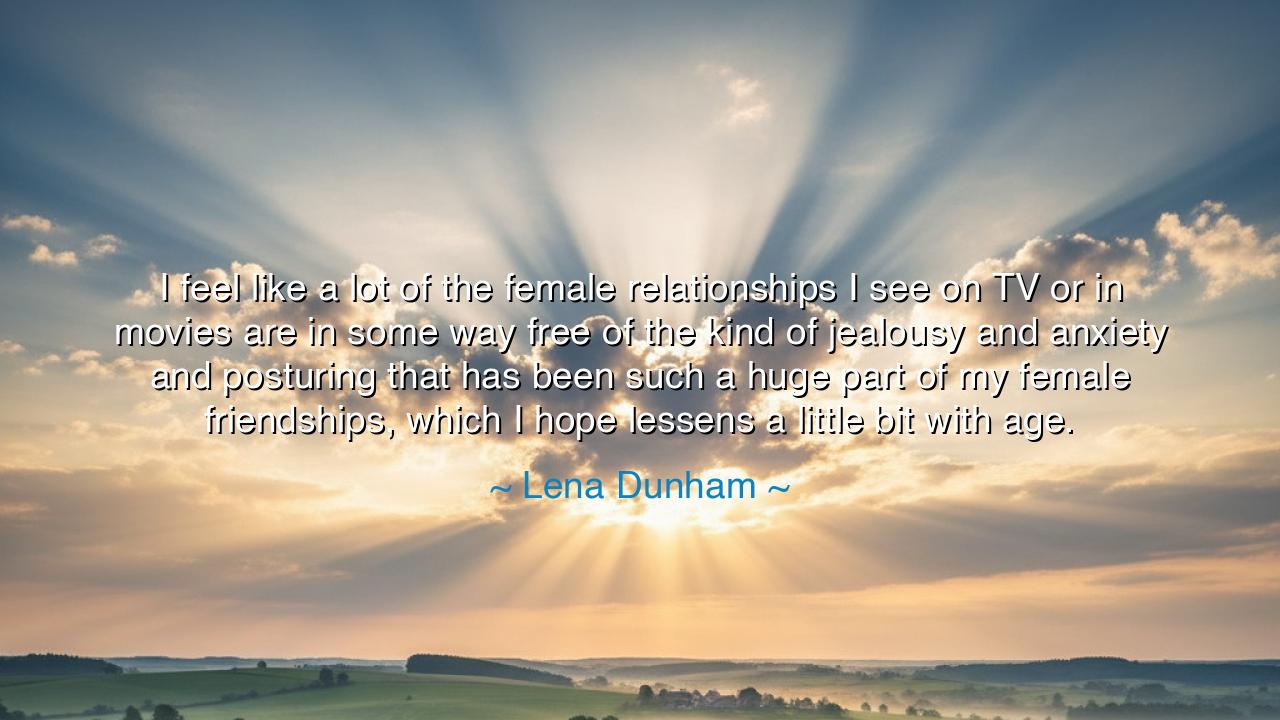
I feel like a lot of the female relationships I see on TV or in
I feel like a lot of the female relationships I see on TV or in movies are in some way free of the kind of jealousy and anxiety and posturing that has been such a huge part of my female friendships, which I hope lessens a little bit with age.






In the confession of Lena Dunham, there lies a truth that many hearts, especially those of women, have quietly known: “I feel like a lot of the female relationships I see on TV or in movies are in some way free of the kind of jealousy and anxiety and posturing that has been such a huge part of my female friendships, which I hope lessens a little bit with age.” Her words are not a lament, but a revelation — an honest unveiling of the complexity of female friendship, the sacred bond that can at once nurture and wound, uplift and unsettle. It is a bond forged not merely in affection, but in the fire of comparison, expectation, and longing — the very forces that shape the human soul.
The ancients, who wrote of heroes and gods, also knew the fierce currents that flow between those who love one another deeply. They told of Athena and Aphrodite, who, though both divine, clashed over the favor of mortals — not out of hatred, but out of the unspoken desire to be seen, to be the most radiant, the most loved. In Dunham’s words we hear the same ancient chord: that even among those who cherish each other, there can be jealousy, that silent companion of affection. It is not born of evil, but of insecurity — the shadow cast when love fears it is not enough.
To understand this, we must look beyond the polished mirrors of fiction, those bright illusions that show women smiling, unburdened by envy or self-doubt. Dunham reminds us that reality is messier, more human. True friendship between women — or between any souls — carries the weight of shared mirrors: one friend reflects the other’s hopes, fears, and unspoken doubts. When one shines, the other may feel her own dimness. When one falters, the other may feel relief mixed with guilt. These emotions, though uncomfortable, are part of the sacred alchemy of growth. Jealousy, when acknowledged, becomes a teacher; when denied, it festers into quiet distance.
History gives us the tale of Mary Wollstonecraft and Fanny Blood, two women bound by intellect and affection in the 18th century. They shared dreams of freedom and creation, yet Wollstonecraft’s deep admiration for her friend was tinged with envy — envy of Fanny’s grace, her serenity, her health. When Fanny died young, Wollstonecraft was left not only with grief, but with a haunting understanding: that she had both loved and envied her dearest companion. From this revelation she wrote with deeper truth, recognizing that love’s highest form is not to possess or surpass, but to honor. Her transformation echoes what Dunham hopes for — that with age, the sharpness of jealousy may soften into understanding.
In Dunham’s reflection is also a longing for authenticity. She observes that the stories we consume often strip relationships of their depth, replacing truth with idealization. Yet what she desires — and what we must all seek — is a friendship not free of flaws, but free of pretense. For posturing, that armor we wear to seem better, stronger, more desirable, builds walls where tenderness could grow. To be truly known by another, we must dare to be unguarded, to admit our envy, our anxiety, our yearning to be loved. Only then does friendship transcend comparison and become communion.
The ancients taught that the soul ripens through honesty. Just as iron sharpens iron, so too do imperfect hearts refine each other through conflict and compassion. When jealousy arises between friends, it need not destroy the bond. Instead, it can reveal where one’s own sense of worth still trembles. The wise do not flee from this realization; they turn inward, tending the wound with humility. For as Dunham says, time and experience can temper the spirit — age brings perspective, and perspective brings peace.
The lesson is clear: love that endures must be honest about its shadows. Do not seek friendships that are perfect, for perfection is a performance, not a truth. Seek instead those who can hold your weakness without judgment, and to whom you can confess, “I envy you — and yet I love you.” From that confession comes liberation. From that humility grows a friendship that no jealousy can undo.
And so, dear listener, let us walk in the wisdom of this teaching. Cherish your friends not because they mirror your strengths, but because they reveal your humanity. When jealousy or anxiety stirs within you, do not condemn it — study it. Let it show you where your spirit still aches for affirmation. Then, bless those who awaken that ache, for they are your silent teachers. In doing so, you will outgrow the restless need to compare, and instead, you will learn the ancient art of loving others — and yourself — in full, flawed, radiant truth.






AAdministratorAdministrator
Welcome, honored guests. Please leave a comment, we will respond soon